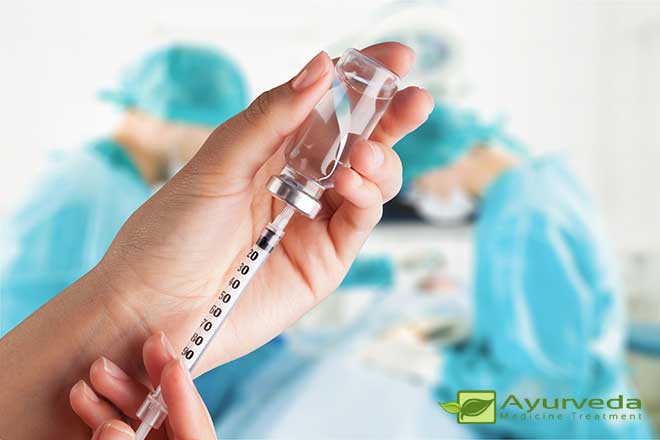
Diabetes is known as Madhumeha in Ayurvedic terminology. It is also known as the ‘Rich man’s disease’. This is because diabetes occurs when a person is over nourished. Once one contracts Diabetes, it is quite difficult to cure it.
One should learn to live with Diabetes. It is a lifelong partner. Hence it is always advisable to prevent it by choosing a disciplined dietary regimen and regular exercises combined with a positive mindset.
Besides, Chronic and acute Diabetes may cause other serious complicacies of various sense and other vital organs of the body.
Causes ofDiabetes
Diabetes occurs due to the malfunctioning of the pancreas gland. The pancreas gland controls the sugar metabolism process. Excessive accumulation of fats (obesity) may also lead to diabetes.
The two types of Diabetes
There are two types of Diabetes: Diabetes Mellitus and Diabetes Insipidus.
Diabetes Mellitus is commonly referred to as Diabetes. When it occurs in children, it is termed ‘Juvenile Diabetes.
In Diabetes Mellitus, the blood sugar level of the patient rises abnormally. The excess sugar comes out of the body in limited quantities via the urine.
On the other hand, in Diabetes Insipidus, the urine will have no trace of the sugar despite the fact that blood the sugar level remains high.
While Diabetes Mellitus is difficult to cure, Diabetes Insipidus can be cured.
Diabetes consequences
Owing to the malfunctioning of the natural sugar metabolism process, the tissue cells are devoid of sugar which is required to produce the required amount of energy. This weakens the patients.
In extreme cases, or in situations where the ailment is not contained at the initial stages, the condition may lead to other complicacies like carbuncles or/ and coma.
The patient may also suffer myopia as a result of prolonged and untreated Diabetes.
Diabetes Symptoms
The common symptoms of Diabetes are excessive thirst and hunger; and excessive urination.
There may be a burning sensation in the soles.
The person would experience a general weakness as well.
Sores and wounds do not heal easily. In many cases, they even fester. This happens as the diabetic loses resistance power.
Dietary Regimen
Consume fresh and fibery vegetables
Regularly have bitter gourd (Karela), Bimbi, Patola, and the drumsticks (leaves as well as the fruit).
Natural means to control sugar level
The patient should be regularly given Neem leaves and flowers.
In fact, a diabetic suffering from high blood sugar level must daily consume two tender leaves of Bilva and Neem. They reduce the sugar level.
Bitter vegetables are ideal natural medicines to keep the blood sugar level under control.
One should daily consume on an empty tummy 30 ml. of bitter gourd juice. For preparation of the juice, both the fruit as well as the tender leaves of the plant can be used.
Ayurvedic Treatments
Ayurveda prescribes Vasanta kusumakara and Shilajatu (mineral pitch) for diabetics.
Shilajatu
The patient should consume 0.125 gm of the medication twice daily. It controls high blood sugar level.
Vasanta Kusumakara
Vasanta kusumakara is the commonly prescribed medication in such conditions. The diabetic should consume 0.125 gm of this drug. It needs to be mixed with half a teaspoon of cream and sugar (one-fourth of a teaspoon). Vasanta kusumakara should be taken on an empty tummy.
What not to eat
The diabetic must follow a controlled diet.
Such a person should take care not to consume the following items: Fruits and cereals having high carbohydrate content. Mention may be made of banana, potato, and rice among others; Sugar; and fatty substances.
Other important points
Quit the habit of sleeping during the daytime.
Daily practise the Pranayamas (Yogic breathing exercises) and especially the Yogic asana known as ‘Paschimotanasana’.
Stay away from pointed or sharp objects. Cuts can turn septic.
Also avoid doing hazardous activities that may involve cuts or bleeding due to accidents.
If a diabetic suffers from other ailments, immediately attend to the disease. This is vitally important as the diabetic loses resistance power. If the new ailment is not treated immediately, the disease may soon aggravate.







Leave a Reply